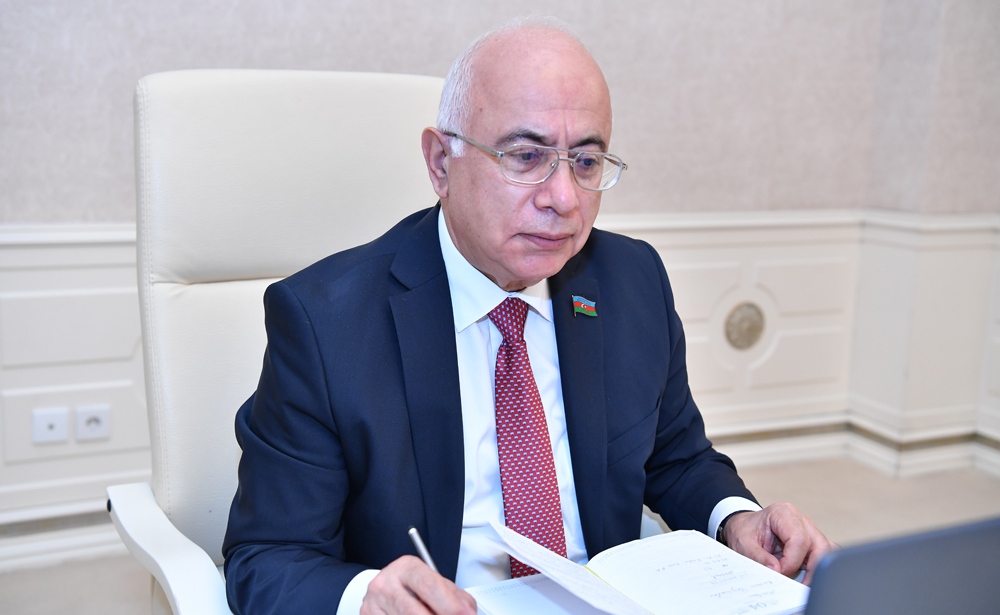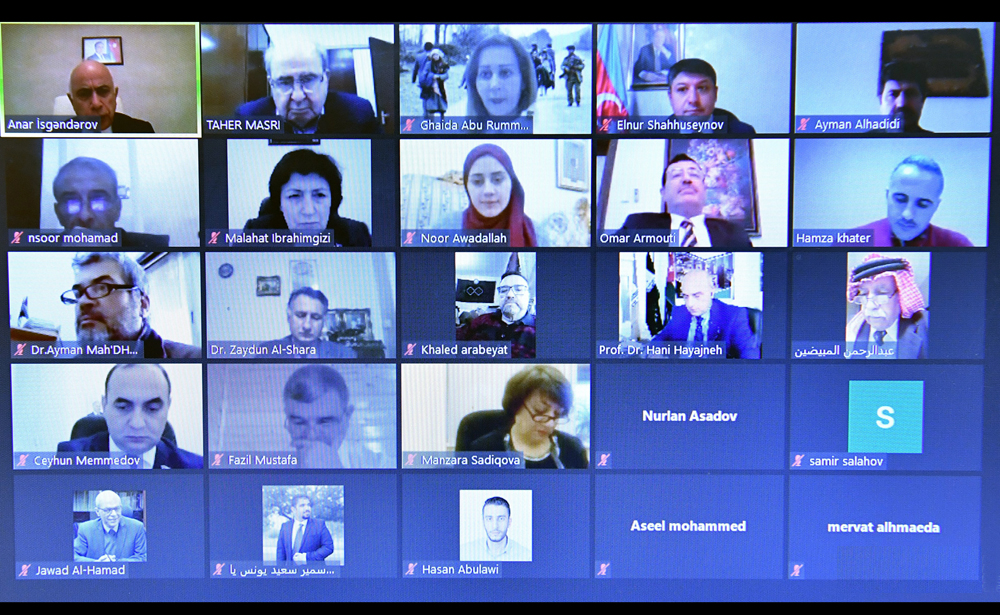Azerbaijani-Jordanian Co-operation Setting High Standards

A videoconference dedicated to the 29th anniversary of the Khojali Genocide brought together the Milli Majlis Working Group for the Azerbaijan-Jordan interparliamentary relations, the former Senate Chairman of the Hashemite Kingdom of Jordan Taher al-Masri and Jordanian politicians and reputed academics on 23 February.
Leader of the above-mentioned Working Group Anar Iskenderov spoke of the past history of our countries and of the diplomatic relations having been advancing upwardly without a hiatus ever since they were established. He expressed the deep gratitude to the Jordanian Senate for having recognised the Khojali Genocide on 19 June 2013.
Azerbaijan could always see the support of Jordan as it was reconquering its own lands during the 44-day war. Both sides will continue making joint efforts to attain most robust bonds of friendship and the highest possible degree of collaboration, Mr Iskenderov said.
The dignified Jordanian politician Taher al-Masri who has served his country as Chairman of the Senate, Prime Minister and Foreign Minister pointed in his speech at the high level of political intercourse between the Kingdom and Azerbaijan. He recalled his repeated visits to Azerbaijan and the attendances of various international-level events.
‘Azerbaijan had left the Soviet Union to progress quickly into an influential state of the region. Azerbaijan’s triumph in the Patriotic War is of utmost importance for the whole Islamic World. We could witness many countries express their solidarity with Azerbaijan in the wake of that victory. Azerbaijan has made big progress with its wise and civil administration and has restored the wholeness of its national territory having thus resolved its most painful problem – the problem of loss of territory. This is a very remarkable success!’ Mr al-Masri was saying.
Director General of Jordan’s Middle East Scientific Research Centre Dr Jawad al-Hamad remarked in his turn that the one-billion-strong Muslim community across the world followed closely every instance of the developments unfolding during the 44-day war, tapping absolutely all the sources of information, and were glad of the historic victory of Azerbaijan. They also highly appreciated the brotherly Turkey’s political and moral backing extended to Azerbaijan when the latter was going through a hard period. Mr al-Hamad finds it an important business to deepen the cultural, economic and otherwise co-operation between Jordan and Azerbaijan.
Members of the Milli Majlis Working Group Malahat Ibrahimghizi, Fazil Mustafa and Jeyhun Mammadov talked about the pressing need to strengthen the Islamic solidarity. They emphasised that the Muslim countries could contribute across the board to the drive for world-wide recognition of the Khojali Genocide and urged the Jordanian colleagues to bring to table their bit. Several thoughts and proposals about making the collaboration amongst our parliamentarians were voiced, too.
A professor and Archaeology Chair Dean at the Yarmouk University Dr Hani Hayajneh, Assistant Rector for International Relations at Al-Isra University Mrs Ghaida Abu Rumman, a professor of the University of Jordan Dr Zeidan ash-Sheraa, a professor of the Political Sciences Chair of the Yarmouk University Dr Ayman Hayajneh and the author of two books on Azerbaijan and a historian Omar al-Armouti condemned the Armenian aggression categorically and described the genocidal act committed in Khojali as atrocious and inhuman, with its perpetrators bound to have their just punishment administered to them. They also stressed the necessity of passing a fair verdict on the Genocide.
The Jordanians voiced their support for the steps taken by Azerbaijan internationally and expressed a wish for multi-faceted co-operation with our country. They congratulated our nation and state and the victorious Commander-in-Chief Ilham Aliyev on the Victory, saying that it mattered much to the whole region.
The charge d’affaires a.i. at the Embassy of Azerbaijan in Jordan Elnur Shahhuseynov brought to the videoconference participants every detail of the Khojali Genocide as one of the bloodiest crimes against humanity ever perpetrated. He also told them of the relevant steps taken in Azerbaijan at the state level and about the ‘Justice for Khojali!’ Campaign before urging the Jordanian intelligentsia and politicians to help make more people in their country aware of the Genocide that turned 29 years this year and make certain that the Genocide is recognised as such by the Muslim World as well as internationally and, last but not least, that a fair political and legal verdict is passed on this crime.
Professor, Dr Muhammad al-Khawaldeh of the Mutah University, Professor, Dr Nabil al-Atoum of the Political Sciences Chair of the Al Balqa’ University and others were taking part in the videoconference as well.
The Press and Public Relations Department
The Milli Majlis




